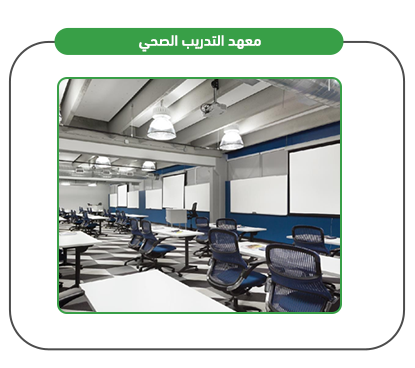The Health Training Institute is a leading institution in the qualification of various medical personnel. It offers integrated programs that combine theoretical and practical aspects, aiming to comprehensively develop trainees’ skills. The institute relies on the latest educational technologies and training methods, contributing to enhancing students’ capabilities and preparing them to meet the growing challenges in the healthcare field. Furthermore, the institute provides trainees with practical training opportunities in recognized healthcare institutions, giving them the opportunity to apply their learning in real-world settings and providing them with field experience that enhances their chances of success and excellence in their field. The institute comprises a select group of experts and professionals who provide a rich educational experience for trainees, enhancing the quality of education provided and helping build a strong foundation for healthcare practices. Through an innovative and supportive educational environment, the Health Training Institute contributes to empowering individuals to develop their career paths, which positively impacts the quality of healthcare provided. Based on the above, the Health Training Institute serves as an effective link between academic education and the requirements of the labor market.

In a world striving for integrated healthcare, the Health Training Institute stands as a beacon of knowledge and excellence. It transcends its mere educational background to become an incubator for ambitious dreams and a creator of qualified healthcare professionals for future generations. The institute offers comprehensive training programs covering diverse fields such as nursing, pharmacy, and first aid. These programs are carefully designed to meet the needs of the growing job market, providing students with the skills and knowledge necessary to succeed in their careers. The Health Training Institute provides an advanced learning environment featuring a modern lecture hall and laboratories equipped with the latest technology, allowing students to apply their theoretical learning in real-world situations. The institute is committed to supporting healthcare workers by offering continuous development programs that contribute to raising their competencies and maintaining the quality of healthcare services. Therefore, if you aspire to a promising career in healthcare, the Health Training Institute is the ideal destination to achieve your academic and professional ambitions.



Providing practical training in real-life settings
Accredited certifications that increase employment opportunities
Developing specialized medical skills
Qualifying healthcare personnel to meet labor market needs
Experienced and qualified trainers
Continuously updating curricula based on the latest medical technologies
Training opportunities and practical application in hospitals and healthcare facilities
Executive summary
Study project services/products
Market Size Analysis
Risk Assessment
Technical study
Financial study
Organizational and administrative study

The Education Sector in the GCC Countries
Believing in the importance of the education sector and its role in promoting the localization of the national workforce, Mashroo3k for Economic Consultancy and Market Research is pleased to present the following key indicators of the education sector in the Gulf Cooperation Council (GCC) countries, inviting investment in this vital field:
The total number of students in Early Childhood Development (including nurseries and kindergartens) across the GCC reached approximately 851,500 students, according to the latest available statistics.
The number of students enrolled in school education stages across the GCC is estimated at around 9.3 million students (79.4% in the public sector and 20.6% in the private sector).
The number of learners in adult education centers is estimated at 181,247 students.
The number of students enrolled in higher education institutions stands at 2,206,446 students.
The number of early childhood teachers is approximately 50,647.
The number of school education teachers is estimated at around 727,904.
There are 5,806 operational early childhood education institutions.
There are 32,310 operational school education institutions.
Over the past years, GCC governments have actively sought to bridge the gap between education and the labor market by adopting educational curricula that emphasize vocational and technical education and encourage learning through modern technologies and digital platforms. It is also worth noting the increasing investment in education quality across the six countries to produce graduates who meet the private sector’s workforce requirements.
According to the latest statistics:
Saudi Arabia allocates 18.9% of its budget to education.
The UAE allocates 14.8% of its budget to education.
Oman allocates 12.2% of its budget to education.
Bahrain allocates 9.8% of its budget to education.
Kuwait allocates 12.3% of its budget to education.
Qatar allocates 10.5% of its budget to education.
By 2023, the value of the private education market in the GCC is expected to reach USD 26.2 billion.
The Global Education Sector
The global education services market was valued at approximately USD 2,882.52 billion by the end of 2021. Experts project that the market will reach USD 3,191.79 billion by the end of 2022, achieving a compound annual growth rate (CAGR) of 10.7%. Furthermore, by 2026, the market value is expected to rise to USD 4,623.90 billion, reflecting a CAGR of 9.7% over the forecast period.

Investment in the Saudi private education sector grew by 3% in 2016, rising to 15.5% compared to 12.5% in 2015. Investment in the private education sector has increased over the past five years, reaching approximately 10 billion riyals.